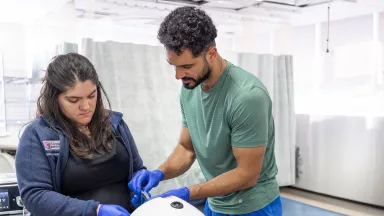Maternal-Fetal Medicine
Varied in their research interests, faculty in this division are very active in both clinical and bench research, and are frequent presenters at national meetings. Research interests of divisional faculty include substance use in pregnancy, umbilical artery Doppler velocimetry, Cesarean Section reduction, sickle cell disease, antepartal testing and its effects on neonatal outcome, gestational diabetes, social interventions in pregnancy, educational interventions in pregnancy, women's health educational needs, preterm labor prevention, postdate pregnancy, macrosomia, content of prenatal care, cervicovaginal beta-hCG as a predictor of preterm delivery, induction of labor, outcomes reseach, fetal hematopoietic stem cell research, fetal asphyxias measured in fetal blood scalp flow rates in lambs, and recombinant DNA techniques for fetal diagnosis.
PORT Prevention of Low Birthweight
The department participated in a Patient Outcome Research Team (PORT) grant dealing with the prevention of low birthweight in minority women funded by the Agency for Healthcare Policy and Research (PCS 282-92-0055). Dr. Irwin Merkatz served as co-principal investigator in collaboration with Dr. Robert Goldenberg at the University of Alabama at Birmingham. The program was designed to improve implementation of techniques known to impact on the morbidity associated with low birthweight and is divided into four stages. The first consisted of an extensive data analysis which supported the conclusion that the underutilization of antenatal corticosteroids useful in accelerating pulmonary maturity was likely an important deficit in current practice activities. Subsequent phases dealt with data accumulation and the demographics to confirm underutilization, an analysis of the data obtained and the dissemination of educational material designed to improve utilization of antenatal corticosteroids, together with the evaluation of those efforts. The project, headed at AECOM by Dr. Margaret Freda, was completed in 1998 and has resulted in multiple publications, including:
Leviton LC, Goldenberg RL, Baker S, Freda MC, Schwartz RM, Fish LJ, Cliver SP, Rouse DW, Raczysinski J, Chazotte C, Merkatz IR. A randomized controlled trial of methods to encourage the use of antenatal corticosteroid therapy for fetal maturation. JAMA 281 (1), 1999, 46-52..
Educational Research and Initiatives
Divisional research has also focused on educational issues. Drs. Chazotte, Bernstein, Freda, Shah, Harrison, Damus and Ms.DeVore, funded by the March of Dimes, developed and evaluated a curriculum for physicians in multiple specialties to teach about preconception health. Dr. Margaret Freda has undertaken extensive research on issues of how best to educate women about various health topics including prevention of preterm birth, informed consent, fetal movement counting, colposcopy, and lifestyle modification. Dr. Chazotte has also developed and evaluated a major curriculum to teach residents about substance abuse in women.
Public Health Initiatives
A strong interest in public health exists among many division members, and is reflected in their publications, presentations and clinical practice. Several division members hold Master's of Public Health degrees. The division has been involved in many community projects designed to improve the health of the community surrounding the medical school, including the nationally known program PROPP (Program to Reduce Obstetrical Problems and Prematurity). This was a large grant-funded program from the Robert Wood Johnson Foundation and Greater New York Chapter of the March of Dimes which viewed the problem of preterm birth as a community problem requiring community solutions. Through PROPP, linkages were formed with all the other providers of prenatal care in the Bronx. Common protocols were developed, a common interdisciplinary medical record was introduced, education was provided to all providers of care, and patient education was initiated with PROPP-developed materials which are now being distributed nationally. Complementing the PROPP was a department-inspired Bronx Perinatal Consortium, a program funded by the state of New York as part of an expanded funding of prenatal care. All women in the state whose income placed them under 185% of the poverty level became eligible for this new funding, thus correcting a major financial barrier of access to care for the "working poor". Through the Bronx Perinatal Consortium, the department provided leadership in community organization, computer expertise, and the formulation of important state and local public policy to assist women in the Bronx in obtaining both comprehensive care and access to more sophisticated technologies. Another public health initiative in which the division faculty has been involved is an exchange program with the country of Albania, sponsored by the US Agency for International Development. Division members have visited Albania on several occasions, and hosted Albanian health care providers in the Bronx. Also through this program, a joint conference was held with obstetrics/gynecology providers in Tirana, Albania in December 1995. This first-ever Albanian/American health care conference focused on Obstetrics, Anesthesia and Neonatal Issues and will serve as a model for additional collaborative efforts in the future.
Dr. Peter Bernstein has received a grant from the March of Dimes Greater New York Chapter to initiate an innovative prenatal care program at Comprehensive Family Care Center where he is the Medical Director. The program, "Centering Pregnancy", is a completely novel approach to the provision of prenatal care, and was elucidated at a Grand Rounds on December 10, 2001 by its developer, Sharon Rising, CNM. The Centering Pregnancy program bases it philosophy on the concept that women need not only medical care, but also education and counseling during pregnancy, and that all those services are difficult to provide in the short visits mandated by health insurance companies. Using Centering Pregnancy, prenatal care is offered in group sessions, with prescribed education and counseling during each session and much interaction between the women and the health care providers. This model is in use in sites all over the country, and is currently the subject of a large NIH funded evaluation project. At CFCC, Dr. Bernstein along with Susan Bellinson, CNM and Carole Moleti, CMN offer Centering Pregnancy to women who agree to be randomized to that program or to conventional prenatal care. Evaluation at the grant's completion, evaluation will consist of tracking pregnancy outcomes, patient satisfaction, patient knowledge of health and pregnancy topics, and other markers.
Dr. Ashlesha Dayal has created the Comprehensive Preconception/Interconception Care Program at Montefiore Medical Center (CPIC), and secured a grant from the Greater New York Chapter of the March of Dimes Birth Defects Foundation to bring the program to fruition. This new program addresses the problem of preterm birth, which now complicates 12% of all births in the United States. In the Bronx, the preterm birth rate is closer to 17%, signaling the need to take special action to reduce its incidence. Dr. Dayal's CPIC program will target Bronx women at risk for a poor pregnancy outcome. These women will have a visit with an MFM specialist, individualized referrals to community resources, and specialized teaching by a perinatal nurse. By identifying these women's individualized risk factors and intervening, Dr. Dayal hopes that risk factors for preterm birth will be ameliorated before the woman becomes pregnant again. She hopes to enroll 300 women during the first year of the grant. In support of this goal, educational sessions will be held for providers in the Bronx, to alert them of the need for preconceptional/interconceptional care. Five such forums are planned in year one. Outcomes to be tracked throughout this program include numbers of referrals from providers and to community resources, patient and provider satisfaction with the program, percentage of women taking folic acid interconceptionally, patient compliance with care, and women's knowledge of pregnancy complications such as preterm birth.
MACS Study
The Division of Maternal Fetal Medicine has joined a multinational randomized controlled trial comparing single dose antenatal steroids with multiple doses given at 14 day intervals until 33 weeks gestation. The MACS (Multiple Antenatal Corticosteroid Study) has been funded by the Canadian Health Research Institute (the equivalent of the NIH in Canada). The primary site is the University of Toronto, and the study is under the direction of Dr. Kelly Murphy, a former AECOM resident in our Department. This study is an important one, and is one more in a long line of prematurity related studies in which we have participated over the past 16 years. The PROPP study (1984-1989) was aimed at learning more about preterm birth risk in an urban area, utilizing a uniform medical record, and teaching providers and patients about preterm symptoms. In the 1990's we participated in the PORT study to determine how to increase physician use of a single course of antenatal steroids given to women at risk for preterm birth, for although that medication had already been shown to reduce many of the sequelae of prematurity, only 17% of physicians nationwide were using that drug. Through PORT we learned that providing intensive education to physicians, and by using chart reminders, appropriate antenatal corticosteroid use could increase dramatically.
The NIH clearly supports the use of a single dose of corticosteroids. The initial research suggested that the peak effect of the steroids is reached in 48 hours following the steroid administration and lasts for 7 days. There has been some research done recently to see if more than one course of steroids provides further benefit if given 7 or more days after the first dose. The risks and benefits of this practice are unclear at the present time. In their recent consensus statement (August 2000) on the use of multiple courses of antenatal steroids, the NIH found that at present there was insufficient evidence to support routine use of multiple courses of steroids, and that further information from randomized controlled trials was needed. The MACS study should help us to answer this very important question in our specialty. A total of 1900 women are expected to be enrolled in all the sites in Canada and the United States. The primary outcome is perinatal or neonatal mortality up to 28 days of age. Significant neonatal morbidity such as Respiratory Distress Syndrome (RDS), Bronchopulmonary Dysplasia (BPD), Intraventricular Hemorrhage (IVH) and Necrotizing Enterocolitis (NEC) are also outcomes of interest. Postnatal follow up at 2 years of age is planned to assess for neurologic impairment. At Weiler Hospital, the MACS study is coordinated by Dr. Irwin Merkatz and Dr. Setul Pardanani.
Ongoing Collaborative Research in Basic Science Laboratories
Fellows have worked collaboratively in several laboratories of basic science researchers at the Albert Einstein College of Medicine and the Montefiore Medical Center. Dr. Sandra Reznik's, MD, PhD laboratory in the Department of Pathology has supported ongoing fellow research in the area of the role of endothelin converting enzyme in the placenta and adverse pregnancy outcome in a mouse model. Drs. Karen Koscica and Georges Sylvestre have both been productive in fellow research in Dr. Reznik's lab. Dr. Francine Einstein of the MFM Division has being working in the laboratory of Nir Barzilai, MD, Departments of Medicine and Molecular Genetics in the area of insulin resistance in an animal model. Dr. Jacob Rand, Department of Pathology, is a leading researcher in the role of Annexin V in adverse pregnancy outcome. Dr. Peter Van Eerden of the MFM Division has been an active member of that research team. The MFM Division has also worked collaboratively with Maureen Charron, PhD, Department of Biochemistry, in investigations of glucose transport across the placenta in pregnancies complicated by diabetes.





